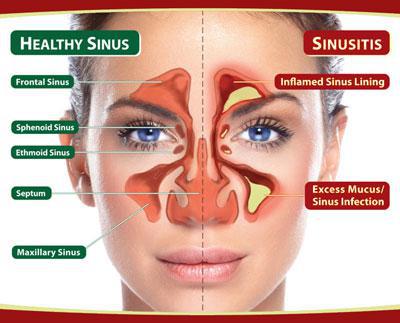Stuffy nose, watery eyes, sneezing, etc. are the symptoms of a nose infection, which if left untreated can cause severe health complications including breathing problem, recurrent headaches, and sinusitis. In most cases, a nasal infection may result from bacterial growth due to excessive nose blowing or nose picking and causes formation of crusts and bleeding when they come off. Nose infections are mostly acute and may develop because of a fungal, bacterial, or viral infection.
Causes
Nasal infections can stem from numerous factors; however, it always results from fluid and mucus becoming trapped in the nasal cavity.
- Fungi: the nasal vestibule either is invaded by fungi as in chronic indolent sinusitis or react to fungi in the air, as in allergic fungal sinusitis.
- Pollutants: irritants or chemicals in the air can cause a buildup of mucus
- Bacteria: 1 in 10 cases of nasal infection in adults are caused by bacteria
- Viruses: 90% of nose infection cases in adults result from virus infection
- Weakened immune system
- Smoking also causes nose infection
There are many ways in which nose infections can be caused, hence, it is difficult to pinpoint the exact cause without proper diagnosis.
Symptoms
- Dental pain
- Fatigue
- Bad breath
- Fever
- Congestion or cough
- Runny nose
- Stuffed-up nose
If the condition worsens, the symptoms may become severe
- Recurrent fever, headache, and cough
- Mouth breathing
- Severe nose block
- Nose bleeds
- Facial pain or pressure
Home Remedies for Treating Nose Infections
Although both the bacterial and fungal nose infections tend to resolve over time, symptoms like overall fatigue, pain, pressure in your head, and heavily congested nasal passage can really disturb the quality of life you are living. We generally recommend medications; however, if we think the condition can be cured through proper home care, we provide the patients with home remedies to help a nose infection.
- Drink plenty of fluids, especially water
- Balance your gut flora by ingesting ‘good’ bacteria, as it will help boost your immune system, giving your body the ability to fight infections
- Take natural anti-viral foods like garlic, oregano oil, olive leaf, honey, vitamin C, and zinc
- Drink natural decongestants in the form of shots, teas, and tonics. Recommended ingredients to include in the drink: horseradish, lemon, turmeric, ginger, apple cider vinegar, and garlic
- Steam inhalation, vaporizers, and hot showers
- Nasal Rinse
- Hot and cold compress
- Facial massage
- Sleep (prioritize this one!)
Why Take Nose Infections Seriously?
As said, nose infections generally clear up on their own, so most people don’t tend to put extra thought on taking extra care of themselves in such situation. However, nose infections are primarily viral or bacterial infections that can worsen up the condition if immediate action is not taken. Two of the most severe complications of nose infections are sinusitis and deviated nasal septum.
What is Sinusitis?
The sinuses are a connected system of hollow cavities (filled with air) in the skull. They are lined with pink, soft tissue called mucosa and are empty except for a thin layer of mucus. Sinusitis occurs when the soft tissue lining becomes inflamed. Healthy sinuses are hollow; however, when they are blocked and filled with fluid due to inflammation, it can cause an accumulation of germs that ultimately results in infection.
Sinusitis needs to be treated at an early stage. If left untreated, it can cause several serious complications including problems with vision and certain neurological disorders. If it spreads, the complications of the disease may include:
- Complete or Partial loss of the sense of smell
- Brain Abscess/Meningitis
- Diminished or double vision
If these symptoms persist for 10 weeks or longer, the doctor may diagnose chronic sinusitis.
What is Deviated Nasal Septum?
A deviated nose septum is a condition where the cartilage and bone dividing the nasal cavity goes significantly off-centered, making breathing difficult. In cases, people suffer from deviated septum by birth, and in other cases, it is developed after an injury to the nose. Symptoms may include:
- Nose infections
- Headache
- Nosebleed
- Postnasal drip
- Loud breathing
- Facial pain
Treatment
The treatment options for sinusitis and deviated nasal depend on how long the condition persists. Most acute and sub-acute cases will be resolved without treatment (some symptoms of deviated nasal and sinusitis can be relieved with medications). The ENT doctor will prescribe you home remedies in such cases. However, the condition can be uncomfortable, so upon endoscopy tests, the doctor may prescribe over-the-counter medications to relieve the symptoms.
In the case of chronic sinusitis, they can be treated with anti-fungal drugs. The doctor may also prescribe corticosteroid sprays to help prevent recurrent cases. If pollutants are causing sinusitis, you are advised to avoid exposure to allergens like mold or animal dander or the doctor may prescribe you immunotherapy.
If the condition worsens causing structural issues, surgery may require. The ENT specialist will recommend surgery if the sinusitis has resisted all other treatments. Surgery is always the last resort on the condition.
Why Pristyn Care?
At Pristyn Care, we have many treatment options for sinusitis patients with the latest being FESS (Functional Endoscopic Sinusitis Surgery), Septoplasty, and Microdebrider.
#1 FESS
It is a minimally invasive technique where sinus ostia and sinus air cells are opened under direct visualization. Our ENT department boasts instruments that have been designed solely for the purpose of FESS. We have successfully treated patients with infectious and inflammatory sinuses using FESS. It is performed using a small camera called endoscope allowing the surgeons to complete the procedure using detailed image guidance. This is the best sinus treatment you can get with 100% results, and it is only available at Pristyn Care.
#2 Septoplasty
Septoplasty is the surgical procedure for correcting the disfigured septum. The procedure works to straighten the septum, allowing for improved airflow through the nose. It takes our surgeons anywhere between 30-90 minutes to complete the procedure; however, it depends on the complexity of the condition. It is performed under general anesthesia where the surgeon will make a small incision on one side of the nose to access the septum. Any barriers like extra pieces of cartilage or bone are removed in the procedure to straighten the septum.
#3 Microdebrider
Microdebriders offer new surgical options for carrying out several types of otolaryngology procedures, including sinusitis surgery and tonsillectomy. Microdebriders are cylindrical instruments with hollow tube comprising of an outer and inner portion. The proceedings conducted using Microdebriders are less painful, have minor complications, offers more disease clearance, and you will have a short stay at our clinic.
Our goal is to use technology at its best to make the miseries of people go away. This is the reason why we always intervene with the latest technologies in the medical field to bring out the best in our patients. And with a team of experienced ENT specialists, we have set a benchmark amongst the EN



